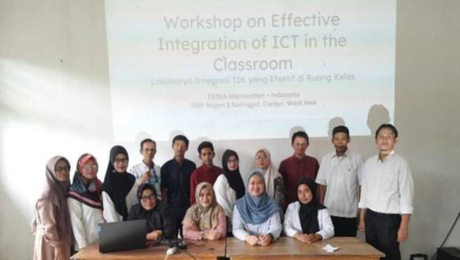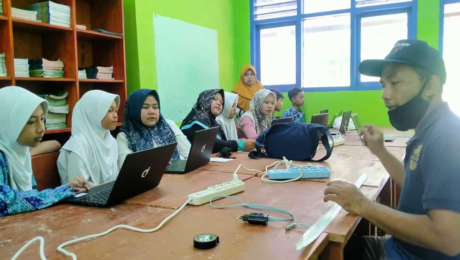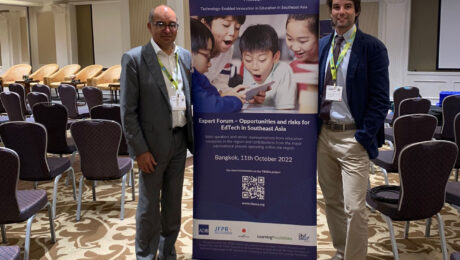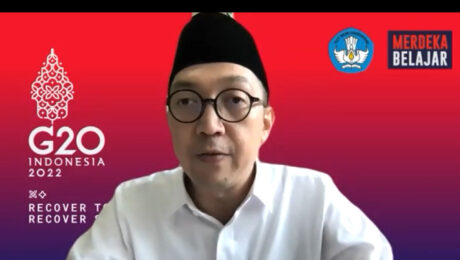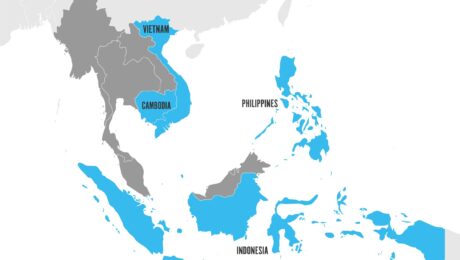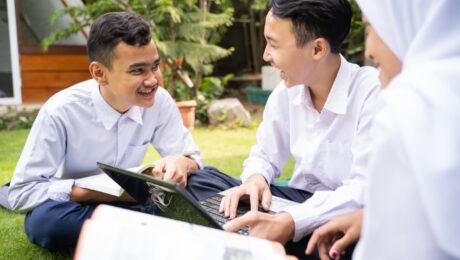Workshop on Effective Integration of ICT in the Classroom
The integration of Information and Communication Technology (ICT) in the classroom is not limited to urban areas, but it is also important in rural areas. However, teachers in rural face unique challenges when integrating ICT into their teaching practice due to factors such as limited infrastructure, lack of access to resources, and limited technology literacy among students and teachers. A workshop on “Effective Integration of ICT in the Classroom” in rural areas has been designed under the Indonesia intervention and conducted to address this issue. The workshop was carried out on 3-6 April 2023 and aimed to equip teachers in rural areas with the necessary knowledge, skills, and resources to effectively integrate ICT tools and resources into their teaching practice.
The workshop aimed to introduce teachers to various ICT tools and resources available for classroom use, demonstrate how to effectively integrate ICT in lesson planning and delivery, and provide hands-on experience with various ICT tools and resources.
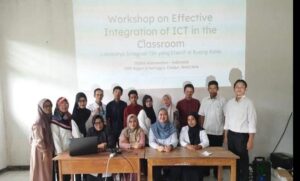

- Published in All Reports, Indonesia All Reports, Indonesia Pilot Interventions
Launch of the Intervention in Indonesia and Delivery of the Equipment
The pilot intervention in Indonesia is designed to provide capacity building for teachers to develop their digital literacy by introducing the Merdeka Mengajar platform and teaching STEM using technology within a minimal internet connectivity area. It includes a series of capacity-building workshops, learning materials development, pilot testing, and reporting. It is expected that this intervention will ensure the readiness of teachers to implement the Merdeka Curriculum.
Naringgul village has been selected randomly from the group of low socioeconomic, lack of internet connectivity but highly populated area in Indonesia. The junior high schools selected for the intervention are four schools in Naringgul village under the District of Cianjur – West Java, Indonesia. For the TIESEA intervention, 4 schools are selected randomly: SMPN 3, 6, 8, and SMPN 9 Naringgul.
In order to start the intervention, the requirement equipment was procured and then installed in March 2023. Each of the 4 targeted schools received 20 ARM-based technology laptops. Besides laptops, other hardware was delivered and installed to set up a computer laboratory, such as LCD projectors, portable sound systems, charging carts, UPS, and other electrical and lighting equipment. A digital library was also set up with the help of our partner SEAMOLEC technical team.
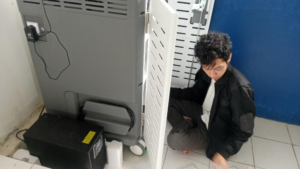 |
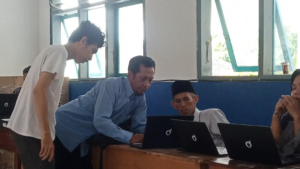 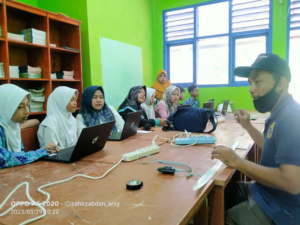 |
Caption: Inspection and installation of the equipment delivered in Naringgul schools, Cianjur, West Java, Indonesia, on 28-30 March 2023.
- Published in All Reports, Indonesia All Reports, Indonesia Pilot Interventions
TIESEA EdTech Interventions Proposal
Educational Technology (EdTech) has the power and capacity to significantly enhance teaching and learning for students in all parts of the world. Online, and digitally-enhanced, learning provides a new dimension that offers potentially unlimited opportunities; but, as we learnt during the COVID pandemic, these opportunities are unevenly spread. As a result of school closures, coupled with poor infrastructure, we know that many children in middle-income countries suffered almost two years without access to any form of tuition.
The Technology-Enabled Innovation in Education in South-East Asia (TIESEA) is a two-year multi-country program funded by the Japan Fund for Prosperous and Resilient Asia and the Pacific through the Asian Development Bank (ADB) and implemented by a joint venture between IBF International Consulting and Learning Possibilities. Aimed at piloting EdTech devices both in school and at home for students and teachers at secondary school level in order to assess the extent to which EdTech devices can be used to improve the learning and teaching quality among target students and teachers in the pilot school and community.
The TIESEA project, therefore, has an overriding ambition of proposing EdTech solutions in the four partner countries that are relevant, realistic, scalable, and sustainable; and which serve to bridge rather than deepen the digital divide. A common feature across all the country profiles is weak, unreliable, and uneven access to internet connectivity, especially in non-urban locations, and poor availability of EdTech devices for students.
Accordingly, in most interventions, at least part of the proposed solution is through providing rich and comprehensive learning resources through content-rich “internet in a box” with local distribution networks for universal access, where there is poor internet access. In most proposed cases the student devices are low-cost and durable tablets and cellphone handsets.
Through trialing the proposals in some of the most challenging environments, the hope of the project team is that there will good demonstrations of how technology-enhanced learning can be promoted and experienced by learners in all conditions. In this way, the TA team aims to show how scalability can be achieved through innovative technology applications and sustainable funding mechanisms that involve the private sector.
The country-level eReadiness assessments already conducted by the in-country experts of the TIESEA Technical Assistance (TA) team have identified the following national needs:
• In Cambodia, a need to use EdTech effectively to promote STEM and resource-based, student-centered education.
• In Indonesia, a need to find a mechanism through which schools in areas with limited Internet connectivity can join the rest of the country in adopting Kurikulum Merdeka (the recently launched, Freedom to Learn curriculum).
• In the Philippines, a need to find a mechanism through which vocational education can be extended to underserved areas of the country supporting youth in those areas to become skilled and work-ready.
• In Viet Nam, a need to equip students to be able to communicate effectively in English in an increasingly global society.
Read the full intervention here
Opportunities and risks for EdTech in Southeast Asia – (Indonesian)
Catch up or re-watch the ‘Opportunities and risks for EdTech in Southeast Asia’ event from Bett Asia, with leading industry experts and senior government leaders.
This recorded session outlines the local situation, country by country, and seeks to demonstrate how the project interventions can overcome obstacles in order to maximise the contribution that EdTech can make to both students’ achievement and the quality of learning in the region.
- Published in Indonesia Workshops, Workshops
Indonesia Webinar Workshop
- Published in All Reports, Indonesia All Reports, Indonesia Workshops, Workshops
Executive Summary – Indonesia (English and Indonesian)
Based on the five pillars of the ADB EdTech Readiness Framework, this report describes the current situation of education in Indonesia in general, with a specific focus on how EdTech is being implemented to improve the quality of teaching and learning. The five pillars of the framework include infrastructure, government, schools/teachers, parents/students, and EdTech providers. By identifying the existing status of EdTech readiness in Indonesia using this framework, the report seeks to provide evidence against which decision-makers can identify initiatives likely to make a positive contribution to the quality of the education ecosystem and opportunities for public-private partnerships.
Download the full report
- Published in All Reports, Indonesia All Reports, Indonesia Summary, Summary
Report on Knowledge Sharing and Ideation Country Workshops and Regional Workshop April 2022
The aim of the TIESEA project is to identify what works in Education Technology (EdTech) in the context of the four countries where the project is operating: Cambodia, Indonesia, Philippines, and Viet Nam. Based on a landscape review of existing EdTech in each country and an assessment of supporting infrastructure as well as teacher, student, and parent capacity, a single intervention will be designed for each country. These pilot interventions will run in each of the countries for one year, and the impact on educational attainment and the quality of learning will be rigorously evaluated. The project will also undertake capacity-building workshops and host a major international conference during 2023 to share the findings of the project and to disseminate more widely the strengths and areas for
development in the key interfaces between schools, homes, families, and technology.
Download the full report
Report on Knowledge Sharing and Ideation Country Workshops and Regional Workshop
Diagnostic Assessment Report – Indonesia Country Report March 2022
Based on the five pillars of the ADB EdTech Readiness Framework, this report describes the current situation of education in Indonesia in general, with a specific focus on how EdTech is being implemented to improve the quality of teaching and learning. The five pillars of the framework include infrastructure, government, schools/teachers, parents/students, and EdTech providers. By identifying the existing status of EdTech readiness in Indonesia using this framework, the report seeks to provide evidence against which decision-makers can identify initiatives likely to make a positive contribution to the quality of the education ecosystem and opportunities for public-private partnerships
Download the full report
- Published in All Reports, Indonesia All Reports, Indonesia Reports, Reports
